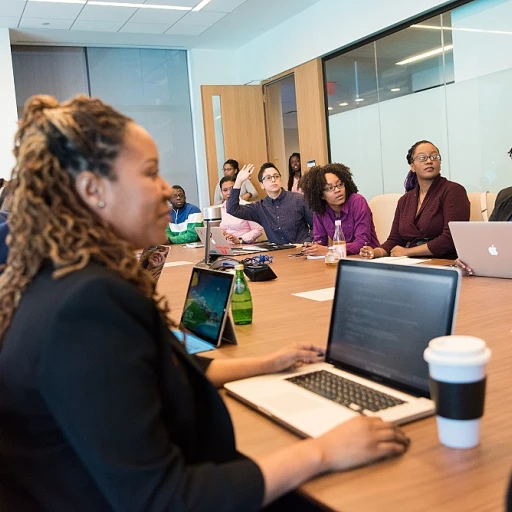The Intersection of Economics and Leadership
Exploring the Synergy Between Economics and Leadership
Understanding the intersection of economics and leadership is crucial for aspiring leaders who aim to navigate complex organizational landscapes. Economics, at its core, provides a framework for making informed decisions that can significantly impact an organization's success. Leadership, on the other hand, involves guiding teams and making strategic choices that align with economic realities.
Incorporating economic insights into leadership practices can enhance decision-making processes. Leaders who grasp key economic concepts are better equipped to anticipate market trends, allocate resources efficiently, and respond to economic challenges. This understanding is particularly vital in today's rapidly changing business environment, where economic fluctuations can affect organizational performance.
Integrating Economic Insights into Leadership Strategies
For leaders, integrating economic insights into their strategies involves understanding various economic principles and their implications. This includes recognizing how supply and demand dynamics can influence pricing strategies or how fiscal policies might affect business operations. Programs offered by institutions like Duke University and Yale University provide valuable resources for leaders seeking to enhance their economic acumen.
Moreover, virtual programs and courses tailored for high school and college students can lay the foundation for future leaders. These programs often cover essential topics such as public policy, economic challenges, and leadership skills, equipping participants with the knowledge needed to excel in leadership roles.
Building Leadership Skills Through Economic Education
Educational initiatives, such as summer programs and virtual courses, play a significant role in teaching economics to aspiring leaders. By participating in these programs, students gain a deeper understanding of economic concepts and their practical applications. This knowledge empowers them to make informed decisions, whether they are leading a small team or steering a large organization.
In conclusion, the synergy between economics and leadership is undeniable. By embracing economic education and applying these insights to leadership practices, aspiring leaders can position themselves for success in an increasingly complex world.
Key Economic Concepts Every Leader Should Know
Essential Economic Principles for Emerging Leaders
Aspiring leaders often find themselves navigating the dynamic intersection between economics and leadership. To do this effectively, it's crucial to grasp certain economic concepts that play a pivotal role in decision-making processes. From understanding supply and demand dynamics to deciphering the intricacies of market structures, these components form the backbone of many economic strategies adopted by successful leaders.- Supply and Demand: Knowing how these forces interact helps leaders in adapting strategies that align with current market conditions, making informed policy choices and investment decisions.
- Market Structures: Understanding different market types like monopolies and oligopolies aids leaders in predicting competition behavior, which is essential for strategic planning.
- Macroeconomic Indicators: Key metrics such as GDP, inflation rates, and unemployment statistics guide evidence-based decisions, ensuring alignment with broader economic trends.
Economic Challenges and Opportunities for Leaders
Economic Hurdles and Growth Paths for Leaders
In navigating the complex environment of modern leadership, it's inevitable for economics leaders to face both challenges and opportunities. Recognizing and deciphering these factors are vital for leaders aspiring to steer their organizations toward success.
- Adapting to Economic Volatility: In periods of economic downturn, such as those influenced by global recessions or market crashes, leaders must employ adept crisis management skills. These situations demand a strategic approach where a leader's ability to pivot swiftly and make judicious policy choices becomes crucial.
- Harnessing Growth Opportunities: Conversely, economic upturns provide a fertile ground for expansion and innovation. Leaders can leverage virtual programs and university courses, such as those offered by Growmatic.io, to build foundational skills in emerging markets.
Educational Programs: A Resource for Future Leaders
Educational establishments play a crucial role in equipping future leaders with necessary skills. Institutions like Duke University and Yale University are renowned for their advanced programs, including specialized economics modules relevant to diverse fields such as public policy. Programs high on the educational ladder, including those geared towards high school and college students, are integral in instilling leadership skills at a young age.
- EFL Virtual Programs: These exclusive e-learning opportunities are spearheaded by programs that cater to non-native English speakers, emphasizing economic concepts and enhancing leadership skills among school and college students.
- Summer Schools and Leadership Camps: Engaging in these immersive learning experiences, such as those from the University of Colorado's summer program, can significantly enrich a leader's understanding of economics and enable them to apply these lessons in real-world scenarios.
By capitalizing on these educational opportunities, leaders can effectively tackle economic challenges while also identifying avenues for growth and innovation.
The Role of Economic Policy in Leadership
Economic Policy: A Crucial Element in Leadership
In the complex world of leadership, understanding economic policy is not just beneficial; it's essential. Leaders must navigate a landscape where economic decisions significantly impact their organizations and the broader society. This requires a deep comprehension of how policy choices influence both the micro and macroeconomic environments.
The Influence of Economic Policy on Leadership Decisions
Economic policies shape the framework within which businesses and organizations operate. They affect everything from interest rates and inflation to trade agreements and labor laws. Leaders who grasp these dynamics can make informed decisions that align with their strategic goals. For instance, understanding how tax policies affect business operations can help leaders optimize their financial strategies.
Educational Programs for Aspiring Economic Leaders
To build expertise in economic policy, leaders can benefit from educational programs. Universities like Duke University and Yale University offer specialized courses that focus on the intersection of economics and leadership. These programs provide students with a foundation in economic concepts and public policy, preparing them to tackle complex economic challenges.
Virtual Learning Opportunities
For those unable to attend in-person classes, virtual programs provide an excellent alternative. Many universities offer online courses that cover essential economic topics, allowing leaders to learn at their own pace. These virtual programs are especially beneficial for high school students and professionals looking to enhance their leadership skills without disrupting their current commitments.
Practical Applications of Economic Policy in Leadership
Leaders must apply their understanding of economic policy to real-world situations. This involves analyzing how different policy scenarios might impact their organization and making strategic adjustments accordingly. For example, in a high inflation environment, leaders might focus on cost-cutting measures or explore new markets to maintain profitability.
In conclusion, mastering economic policy is a vital skill for leaders. By engaging with educational resources and applying economic concepts to their leadership strategies, leaders can navigate the complexities of the modern economic landscape effectively.
Case Studies: Successful Leaders and Economic Decisions
Lessons from Influential Leaders
Examining the decisions of successful leaders can provide valuable insights into the intersection of economics and leadership. These case studies highlight how leaders have navigated economic challenges and leveraged opportunities to achieve their goals.
Warren Buffett: Strategic Economic Decisions
Warren Buffett, CEO of Berkshire Hathaway, is renowned for his ability to make strategic economic decisions. His leadership exemplifies the importance of understanding economic concepts and applying them to investment strategies. By focusing on long-term value and maintaining a disciplined approach, Buffett has consistently outperformed the market, illustrating the power of informed economic decision-making.
Indra Nooyi: Navigating Economic Challenges
Indra Nooyi, former CEO of PepsiCo, successfully navigated economic challenges by implementing innovative strategies. Her leadership during economic downturns involved diversifying PepsiCo's product line and expanding into emerging markets. Nooyi's approach demonstrates how leaders can use economic insights to adapt and thrive in changing environments.
Elon Musk: Embracing Economic Opportunities
Elon Musk, CEO of Tesla and SpaceX, has consistently embraced economic opportunities to drive innovation. By leveraging public policy incentives and focusing on sustainable energy, Musk has positioned his companies at the forefront of technological advancement. His leadership highlights the importance of aligning economic goals with broader societal trends.
Educational Programs for Aspiring Leaders
For aspiring leaders looking to enhance their economic understanding, programs offered by institutions like Duke University and Yale University provide valuable resources. These programs, such as the EFL program and summer courses, equip students with the necessary skills to navigate complex economic landscapes. Engaging in these educational opportunities can help future leaders apply economic concepts effectively in their careers.
Tools and Resources for Leaders to Enhance Economic Understanding
Expanding Economic Acumen Through Education
For aspiring leaders aiming to enhance their understanding of economics, a variety of educational resources are available. These resources cater to different learning preferences and schedules, ensuring that leaders can develop a robust grasp of economic concepts.- University Programs: Institutions like University of Colorado and Yale University offer comprehensive economics courses that delve into economic policy and leadership skills. These programs are ideal for those seeking formal education and a deep dive into economics.
- Virtual Courses: Platforms such as Coursera and edX provide virtual programs that cover essential economic concepts. These courses are particularly beneficial for busy professionals who need flexibility in their learning schedule.
- Summer Programs: High school students can benefit from summer programs that introduce foundational economic principles. Programs like those offered by Duke University help in building early interest and understanding in economics.
- EF Leadership Programs: The EFL program focuses on developing leadership skills alongside economic literacy. These programs are designed to prepare students for making informed policy choices and understanding difficult public issues.
Utilizing Online Resources and Tools
In addition to formal education, leaders can leverage online resources to stay updated on economic trends and policies:- Economic News Platforms: Websites like The Economist and Financial Times provide in-depth analyses and reports on current economic events, offering valuable insights for leaders.
- Public Policy Think Tanks: Organizations such as the Brookings Institution and the Cato Institute offer research and publications that explore economic policy choices and their implications.
- Interactive Tools: Tools like the Federal Reserve Economic Data (FRED) provide access to a wealth of economic data, allowing leaders to analyze trends and make informed decisions.







